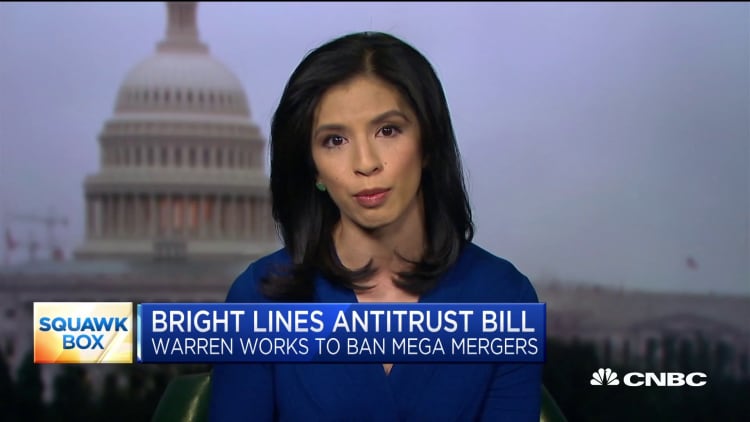
Senator and presidential hopeful Elizabeth Warren is drafting a bill that would ban "mega mergers" between the nation's largest companies as well as try to improve the bargaining power of short-term and temporary workers.
The forthcoming legislation, a collaborative effort with Rep. David Cicilline of the House antitrust subcommittee, would bar tie-ups including a company with over $40 billion in annual revenue or two companies each with at least $15 billion in annual revenue, according to a person familiar with the matter.
It would also grant gig workers the power to unionize, a potential landmark change for ride-hailing companies like Uber Technologies and Lyft, the person told CNBC. Bloomberg News first reported that Warren and Cicilline were working on the legislation.
The proposal would broaden antitrust law beyond the 40-year-old consumer welfare standard, the framework that has dictated antitrust policy in the U.S. for a generation. Under existing regulation, the federal government's antitrust policies assess mergers based on their potential to hurt American consumers with monopolistic prices or diminished quality.
Warren and Cicilline's legislation would, in addition, compel the government to also weigh potential impact on workers and entrepreneurs.
But early response to the proposal suggested not only that the Democrats would have a hard time convincing their Republican peers to support such a measure, but that debate would have to wait until after the impeachment process against President Donald Trump.
"The numbers she has — the $40 billion in sales, no mergers beyond that — what decade does she think we're living in?" asked Republican and longtime political activist Grover Norquist. "We're not living in a time in a time with small companies competing in the world. American leadership has larger companies. It's really an odd 1910 world view."
"This is called an ex post facto law and it's one of the things in the Constitution — which Mrs. Warren has not read evidently — that is specifically forbidden," he added. "She also wants a wealth tax which is also forbidden by the constitution so she's going to have to amend the constitution a lot or ignore it. And my guess is she won't be able to do either."
Warren has long championed stricter rules for Wall Street and has leveraged her zeal for regulation in the 2020 race for the White House. Her proposed wealth tax, in particular, has drawn ire from big investors like Leon Cooperman and Paul Tudor Jones, who argue her plans could trigger a market rout.
She is proposing a 2% tax on household net worth above $50 million and a 6% tax on net worth over $1 billion.
"I'll go on record, if this lady wins, we're in big trouble," Cooperman told CNBC last month.
"A wealth tax makes no sense," Cooperman said. "It would lead to unnatural acts, be near impossible to police, and is probably unconstitutional."
— CNBC's Ylan Mui contributed reporting.


